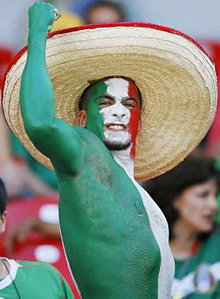
|  |  |  Editorials | Issues | September 2009 Editorials | Issues | September 2009  
Even in Bad Times, the Glad Cry Goes Up
 William Booth - Washington Post William Booth - Washington Post
go to original
September 18, 2009


| | El Grito is noisy, raucous, cathartic - lots of mariachi, tequila, fireworks. |  |
Mexico City - They say it always rains on the night of El Grito, when people gather in plazas across the nation to shout at the top of their lungs "Viva Mexico!" on the eve of their celebration of independence from Spain.

And so it poured - flooding streets - and people said it was kind of funny, in a perverse way, because Mexico is suffering its worst drought in almost 70 years. The nation's reservoirs are half-empty, water is being rationed in the capital and 40 percent of bean, corn and wheat crops surveyed by the government are parched.

In the Plaza Hidalgo in the colonial neighborhood of Coyoacán, Felix Jimenez Granados and his friends were soaked to the skin but merry with beer after the traditional shout, or el grito, went up at 11 sharp Tuesday night.

"It rains on our party, but we would rather have the rain than nothing," said Jimenez, 28, adding that the recession had left him only semi-employed at a private school for toddlers.

Government officials estimate that the Mexican economy will shrink 6.8 percent this year, smothered by the worldwide recession and especially the downturn in the United States, Mexico's leading trade partner. It is the deepest economic slump here since the 1930s.

"Of course things are bad, but who cares? We're Mexicans!" Jimenez said. He and his friends then began laughing and heaping profanities on politicians, police, bosses and a soccer team they despise.

Mexico celebrates its independence in a well-choreographed patriotic two-step.

The first step is El Grito, which is noisy, raucous, cathartic - lots of mariachi, tequila, fireworks. The second step is a huge military parade in the capital center the following day, when columns of tanks and high-stepping soldiers march past balconies of officialdom.

Most Mexicans watch the hardware display on TV, if they watch it at all.

El Grito dates to Sept. 16, 1810, when a restless, unorthodox Catholic priest, Miguel Hidalgo, issued a call to arms against the Spanish, riding a wave of popular rage among masses of Indians and mestizos, who fought under the flag of the Virgin of Guadalupe in a movement that was part revolution, part mob when it began.

Hidalgo was captured and executed a year later.

Security for El Grito was especially tight across the nation, as Mexico remembered an attack at last year's celebration in Morelia, the capital of Michoacán state, in which assailants tossed two grenades into a throng of revelers, killing eight and wounding more than 160.

Michoacán is in an undeclared state of war as federal agents and soldiers fight a drug cartel called La Familia, whose trademark is beheading its enemies.

Authorities have arrested three men in the grenade attack who said they belong to the Zetas, ex-Special Forces soldiers affiliated with a cartel fighting La Familia for turf. Relatives of the suspects say the men confessed after they were tortured.

On Tuesday night, President Felipe Calderón appeared on the balcony of the National Palace in the central Zócalo to lead the national shout.

It might have been a welcome diversion. His party has lost control of Congress and is facing stiff opposition to an economic reform package that seeks to increase taxes on both food and the well-to-do to overcome shortfalls in production by the state-run oil company. Finance Minister Agustín Carstens has warned legislators that "there is no Plan B."

Oil and gas revenue accounts for almost 40 percent of the national budget - and Mexicans have been outraged to read in newspapers how the drug cartels have been stealing millions of dollars in petroleum from the pipelines, some of which has been sold to U.S. refineries.

"The government wants to raise the price of gasoline, and the people are not going to like that," said Agustín Ortega, 33, a cellphone salesman, who was licking an ice cream cone in Coyoacan. His wife, Eva, was wearing a thick fake moustache, a popular El Grito prop this year. Asked whether the price of gas and the Pancho Villa mustache meant revolution was in the air, Ortega laughed and said, "No, that means more complaining." |

 |
|  |



